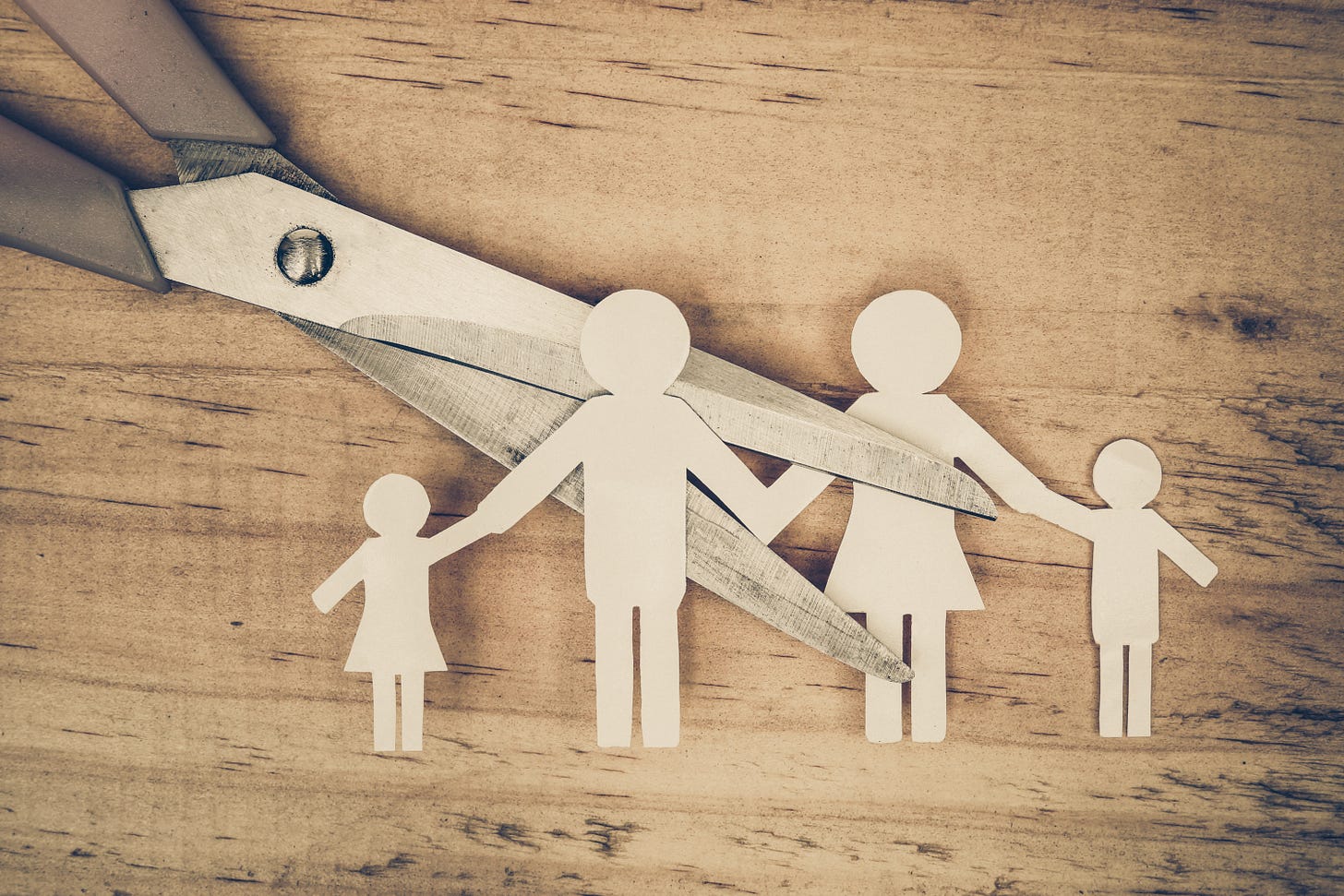In recent years, the family unit has faced unprecedented challenges and scrutiny. But why is this happening? In Western culture, it appears that the family is under siege. This should be concerning for all of us, because we do know that the family is the bedrock of society, providing stability and nurturing the next generation.
Current Trends and Challenges
We are witnessing alarming trends that threaten the fabric of the family unit: divorce rates are skyrocketing, movements promoting non-marriage among men are gaining traction, and increasing discord is evident between genders.
Men and women are meant to complement each other, each bringing unique strengths and perspectives to a relationship.
However, contemporary narratives often promote a competitive dynamic between genders, undermining the cooperative and supportive partnership that is essential for a healthy family structure. This shift is contrary to the natural synergy that has historically defined successful relationships and family units.
Society seems intent on creating division within households, eroding family time, and fostering a sense of disconnection. This intentional disruption is evident in various aspects of modern culture. For instance, Hollywood frequently portrays marriage unfavourably, glamorizing single parenthood and normalizing sex outside of marriage. These portrayals suggest that traditional family structures are outdated or unnecessary, encouraging individuals to prioritize personal freedom and self-fulfilment over the stability and commitment that family life requires. The traditional family structure is frequently depicted in a negative light, if at all, further diminishing its perceived value and relevance.
The media's portrayal of relationships often emphasizes conflict, infidelity, and transient connections, rather than the virtues of commitment, perseverance, and mutual respect.
This skewed representation can influence societal attitudes, making the idea of a stable, lifelong partnership seem less attainable and desirable. As a result, many young people grow up with a distorted view of relationships, where temporary satisfaction is prioritized over long-term commitment.
Moreover, the rise of social media and digital communication has also played a role in eroding family time. The constant barrage of information and the emphasis on individual expression and online personas can distract from real-life interactions and the nurturing of family bonds. Families spend less time together, as each member is often engrossed in their digital devices, leading to a sense of disconnection and weakened relationships.
The increasing economic pressures faced by many families also contribute to this trend. The necessity for dual-income households means that parents have less time to spend with their children, leading to a reliance on external childcare and educational institutions. This shift places additional strain on the family unit, as parents struggle to balance work and family responsibilities.
Cultural and Media Influences
Mainstream pornography consumption is rampant, with 90% of men in the US reportedly watching porn regularly. Pornography causes significant damage to relationships by creating unrealistic expectations and fostering dissatisfaction with real-life partners. It promotes a distorted view of intimacy and can lead to diminished emotional connection and trust between partners.
Over time, frequent consumption of pornography can reduce an individual's capacity for genuine emotional and physical intimacy, leading to feelings of isolation and inadequacy.
This erosion of intimacy and trust results in decreased relationship satisfaction, increased conflicts, and even infidelity, ultimately undermining the foundation of a healthy and loving partnership.
Welfare policies inadvertently encourage single parenthood. Single parenthood negatively affects children's upbringing by placing a significant emotional and financial burden on the single parent, which limits their ability to provide the necessary time, attention, and resources for their child's development.
Children in single-parent households often face higher levels of stress and insecurity due to the absence of one parental figure, which can impact their emotional well-being and stability.
The lack of a second parent also means less support for discipline, guidance, and role modelling, leading to behavioural issues and academic struggles. Furthermore, single parents might struggle to balance work and family responsibilities, resulting in less quality time spent with their children and fewer opportunities for enriching activities, ultimately hindering the child's overall growth and development.
Extreme feminist ideologies sometimes paint men as inherently toxic, perpetuating the notion that masculinity is fundamentally flawed and harmful. This portrayal can contribute to a divisive atmosphere within families, fostering distrust and resentment between genders. Such ideologies may encourage women to view men with suspicion and hostility, undermining the potential for healthy, cooperative relationships.
This negative perspective on men can also discourage positive male involvement in family life, as men may feel marginalized or unwelcome.
The result is a destabilization of family dynamics, where mutual respect and collaboration are replaced by conflict and alienation, ultimately weakening the family's ability to function as a supportive and nurturing unit.
Impact on Future Generations
It is common sense that a dysfunctional family leads to a dysfunctional next generation. Children who grow up in unstable environments often face emotional, psychological, and social challenges that can persist into adulthood. A stable family environment, with both parents present, is crucial for healthy child development.
Each parent contributes uniquely to a child's upbringing; mothers and fathers often provide different perspectives, support systems, and role models, all of which are essential for balanced growth.
The current crisis in the institution of marriage exacerbates these issues. High divorce rates disrupt the family structure, leading to emotional distress for children and often resulting in single-parent households. Neglect of the elderly further demonstrates a societal disregard for familial responsibilities, breaking the intergenerational bonds that strengthen community ties. Children suffering from a lack of guidance and support are more susceptible to negative influences and temptations, such as substance abuse or delinquency, which contribute to broader societal breakdown.
Various modern ideologies challenge and undermine the basic foundations of a healthy society. Some movements question the necessity of traditional family structures, advocating for alternatives that may lack the stability children need.
While it is important to critically examine and address societal issues, there is a significant difference between constructive criticism and the blind rejection of institutions and traditions simply because they are traditional. Traditions often hold wisdom accrued over generations, and dismantling them without careful consideration can lead to unforeseen negative consequences.
This trend is deeply concerning because it threatens the very fabric of society. A strong, stable family unit is the cornerstone of a healthy community, and without it, we risk perpetuating cycles of dysfunction and instability. It is crucial to recognize the value of the family and work towards preserving and strengthening this fundamental institution for the well-being of current and future generations.
The Underlying Agenda
To answer the question "Why?" we need to delve deeper into the consequences of undermining the family unit. Destroying the family unit makes individuals easier to control.
Throughout history, one of the primary objectives of communism was to abolish the traditional family. The reason behind this strategy is clear: when the family, which is the main source of influence and support for individuals, is dismantled, people become more reliant on and susceptible to a central authority.
The family is where individuals first learn values, ethics, and social norms. It provides emotional support, instils a sense of identity, and fosters resilience. When this foundational structure is weakened or removed, individuals lose a critical source of guidance and stability. This void can then be filled by the state or other centralized powers, which can impose their own ideologies and controls more easily. This process homogenizes the population, as the diversity of thought and belief that naturally arises within independent family units is suppressed in favour of a singular, state-approved perspective.
This is why Marx and Engels declared, "Abolish the family!" They understood that a strong family unit could resist state control and maintain cultural and ideological diversity.
By targeting the family, they aimed to create a more uniform, controllable populace. The destruction of the family does not just affect the immediate generation; it disrupts the transmission of cultural traditions, values, and history, ultimately leading to the erosion of a society's cultural fabric.
Destroying the family ultimately destroys culture. Cultures are built upon shared histories, practices, and values, many of which are preserved and passed down through families. When families disintegrate, this cultural continuity is broken. Children grow up without a sense of their heritage or the values that underpin their community.
Over time, this leads to a loss of cultural identity and cohesion, making the population more malleable and easier to govern.
In summary, undermining the family unit facilitates greater control over individuals by removing their primary source of independent influence and support. This strategy, historically utilized by communist regimes, aims to create a homogenized population that is easier to manage. The ultimate consequence is the erosion of cultural identity and continuity, as the diverse and rich traditions upheld by families are lost.
Contemporary Reflections
However, unless I am terribly mistaken, we do not live under communism. So why are Western societies experiencing similar challenges? The answer lies in the broader social and economic dynamics at play. In our increasingly consumer-driven culture, human beings are increasingly seen as consumable objects. This shift manifests in several troubling ways: individuals are indoctrinated from a young age to value material success and productivity above all else, used intensively for their labour during their prime working years, and then discarded once they are no longer deemed economically valuable in old age.
This commodification of human life erodes the intrinsic value and dignity of individuals, reducing them to mere cogs in the economic machine.
As a result, respect for elders, once a cornerstone of societal values, is now diminishing. Traditionally, elders were revered for their wisdom, experience, and the role they played in maintaining and transmitting cultural values. They were integral to the family structure, offering guidance and support to younger generations. Today, however, the elderly are often marginalized, placed in nursing homes, and forgotten by society.
This neglect not only reflects a loss of respect but also a breakdown of the intergenerational bonds that have historically strengthened communities.
Moreover, the emphasis on individualism and self-sufficiency in Western societies contributes to the erosion of family values and communal support systems. The relentless pursuit of personal success often comes at the expense of familial and community relationships. As people become more focused on their careers and personal ambitions, the time and energy available for nurturing family bonds diminish. This shift leads to a more fragmented society where individuals feel isolated and disconnected from one another.
The rise of digital technology and social media further exacerbates these issues. While these tools offer unprecedented connectivity, they also promote superficial interactions and instant gratification.
The deep, meaningful connections that families and communities traditionally provided are increasingly replaced by fleeting digital engagements.
This change undermines the social fabric that holds communities together and contributes to a sense of alienation and disconnection among individuals.
In addition, economic pressures and the demands of modern life leave little room for the traditional family structure. The necessity for dual-income households means that parents have less time to spend with their children, leading to a reliance on external childcare and educational institutions. This shift places additional strain on the family unit, as parents struggle to balance work and family responsibilities.
Ultimately, the challenges faced by Western societies today mirror some of the destructive patterns historically associated with communist regimes, albeit for different reasons. The commodification of human life, the erosion of respect for elders, the fragmentation of family and community bonds, and the pressures of modern economic life all contribute to a societal landscape where individuals are increasingly isolated and vulnerable to control. Addressing these issues requires a renewed focus on the intrinsic value of human life, the importance of familial and communal relationships, and the need for a more balanced and humane approach to economic and social development.
A Personal Anecdote
During a recent vacation in Mallorca with my son and friends from the United States, a valuable lesson on respect unfolded. My son wanted to talk back to a man who reprimanded him for playing near his towel. We advised against it, but he persisted. My friend then told him, "William, you need to respect the elderly." This simple sentence resonated with my son, and he listened. Today, such respect is waning.
Our parents dedicate decades of their lives to raising us, yet when it is our turn to care for them, we often abandon them to nursing homes, displaying a profound lack of respect.
The Path Forward
How did our culture arrive at this point? It is crucial to stand strong and not lose hope. Focus on building and nurturing your family with fierce determination.
Educate your children, instilling in them the values of respect, resilience, and critical thinking.
Marriage, in my view, is a sacred union transcending mere legal and social arrangements. It embodies a profound spiritual connection between a man and a woman, a divine partnership blessed by a higher power, symbolizing unity and oneness. Through marriage, couples support each other's spiritual growth and development, laying a foundation for mutual understanding, love, and respect. This spiritual dimension of marriage offers a deeper purpose, where life's challenges and joys are shared, and the journey towards spiritual fulfilment is undertaken together.
Marriage is not easy; it is a challenging endeavour requiring mutual sacrifices, understanding, discipline, and persistence. Both partners will make mistakes, and marriages will experience cycles of rough and smooth times. Growth comes from facing challenges and difficulties, not merely through good times.
Conclusion
In conclusion, the attack on the family unit is a significant issue that requires our attention and action. By recognizing the value of the family and working to preserve it, we can help ensure a stable and healthy society for future generations.








